Mises, Ludwig von. Human Action: A Treatise on Economics
Подождите немного. Документ загружается.

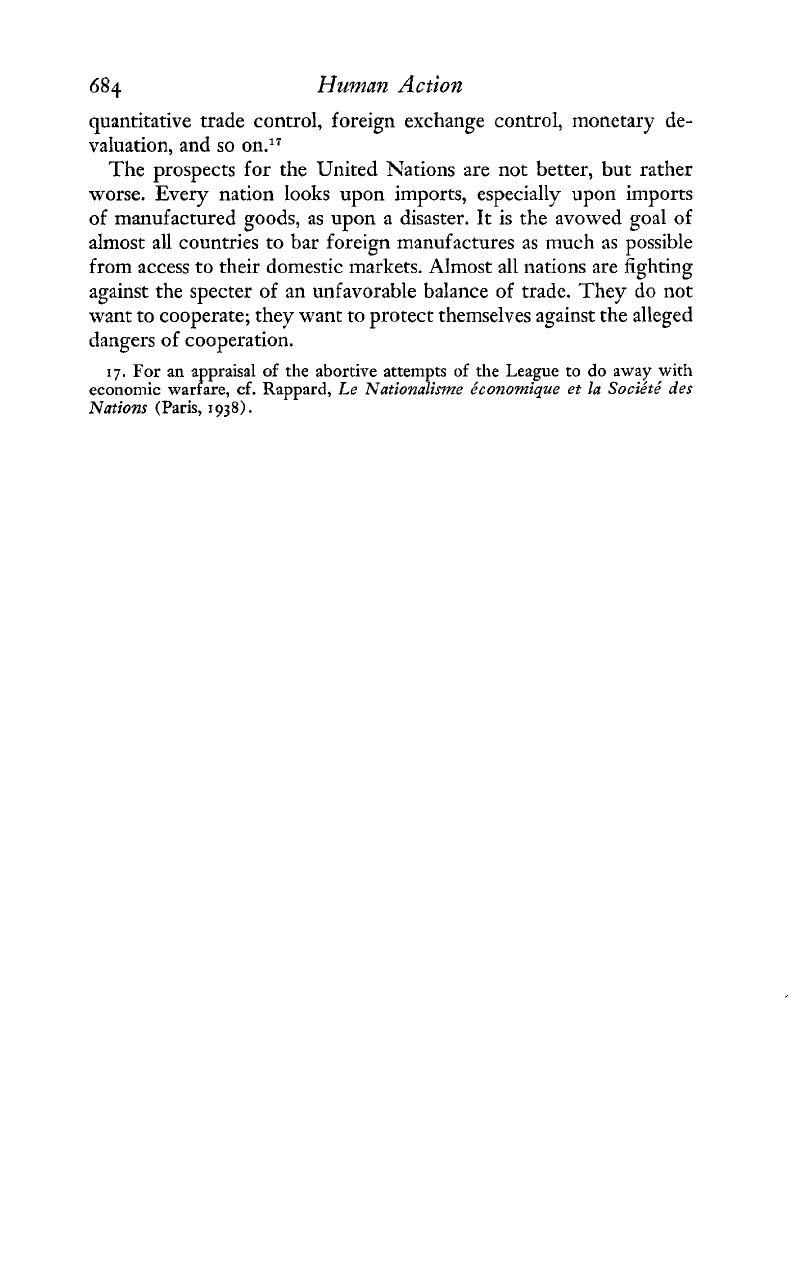
Human
Action
quantitative trade control, foreign exchange control, monetary de-
valuation, and so on.17
The prospects for the United hlations are not better, but rather
worse. Every nation looks upon imports, especially upon imports
of manufactured goods, as upon a disaster. It is the avowed goal of
almost all countries to bar foreign manufactures as much as possible
from access to their domestic markets. Almost all nations are fighting
against the specter of an unfavorable balance of trade. They do not
want to cooperate; they want to protect themselves against the alleged
dangers of cooperation.
17.
For an a praisal
of
the abortive attempts
of
the League to do away
with
economic
war
f
are, cf. Rappard,
Le
Nationalisme e'conomique
et
la
Sociite'
des
Nations
(Paris,
I
938).
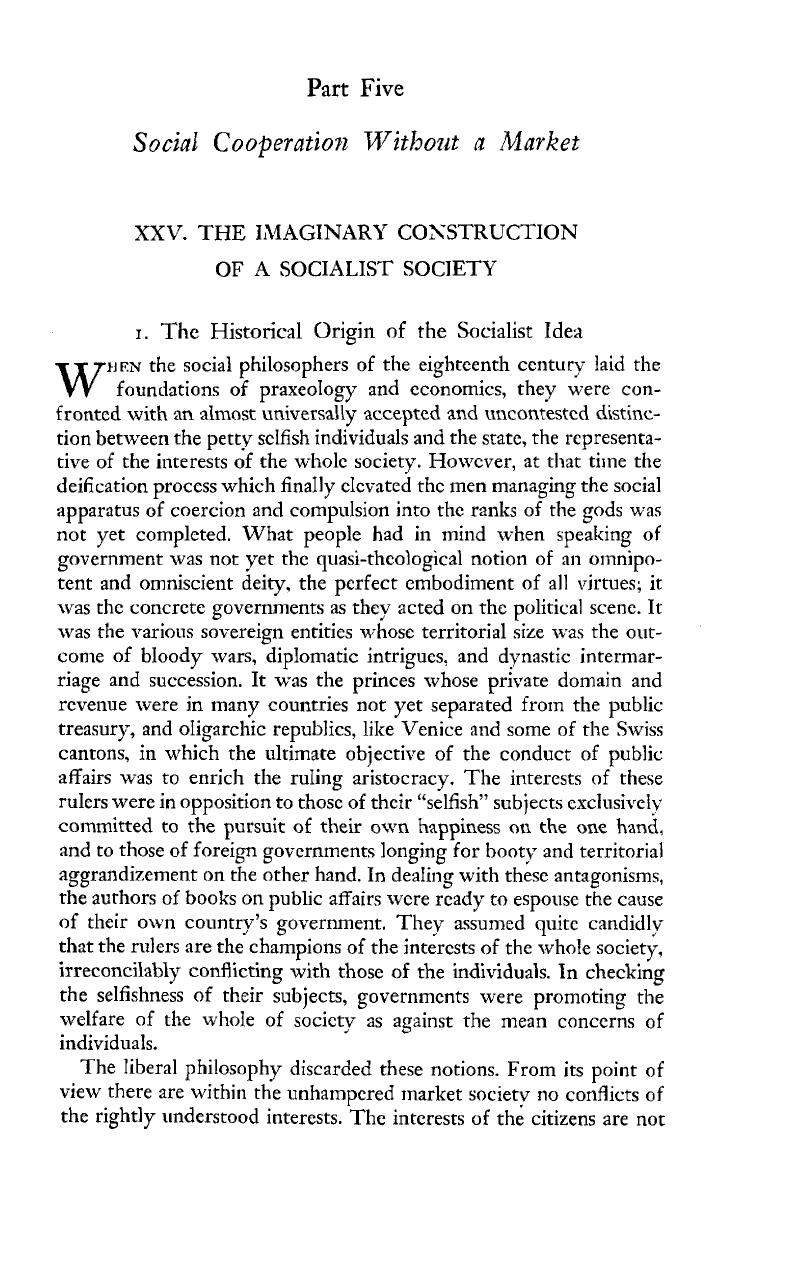
Part
Five
Social Cooperation
Without
n
Market
XXV.
THE
IMAGINARY COSSTRUCTION
OF
A
SOCIALIST SOCIETY
I.
The Historical Origin
of
the
Socialist
Idea
$N
the social philosophers of the eightcenth ccntury laid the
foundations of praxeology and cconornics, they were con-
W"
f
rontcd with
an
almost universally accepted and
uncontested
distinc-
tion between the petty sclfish individuals and the state, the representa-
tive of the interests
df
the wholc society. Howcver, at that tirne the
deification process which finally eIcvated thc men managing the social
apparatus of coercion and compulsion into thc ranks of the gods was
not yet complcted. What people had in mind when speaking of
government was not yet thc
quasi-theological
notion of
an
ornnipo-
tent and omniscient deity, the pcrfect embodiment of all virtues; it
was thc concrcte governments
ns
they acted on the political scene. It
was the various sovereign entities whose territorial size was the out-
come of bloody wars, diplomatic intrigues, and dynastic intermar-
riage and succession. It was the princes whose prjvate domain and
rcveilue were in many countries not yet separated from the public
treasury, and oligarchic republics, like Venice and some
of
the Swiss
cantons, in which the ultimate objective of the conduct of public
affairs was to enrich the ruIing aristocracy. The interests of these
rulers were in opposition to thosc of their "selfish" subjects cxclusivelv
committed to the pursuit of their own happiness
on
the one
han&
and to those of foreign govcrnrnents longing for booty and territorial
aggrandizement on the other hand. In deaiing with thew antagonisms,
the authors
of
books on public affairs wcre ready to espouse the cause
of their own country's government. They assumed quitc candidly
that the rulcrs are the champions of the intercsts of the whole society,
irreconcilably conflicting
with
thosc of the individuals. In checking
the selfishness of their subjects, governrncnts were promoting the
wclfare of the whole of socicty as against the mean conccrns of
individuals.
The liberal philosophy discarded these notions. From its point of
view there are within the unharnpcred market societv no conflicts of
the rightly understood interests.
The
intcrests
of
the citizens are not
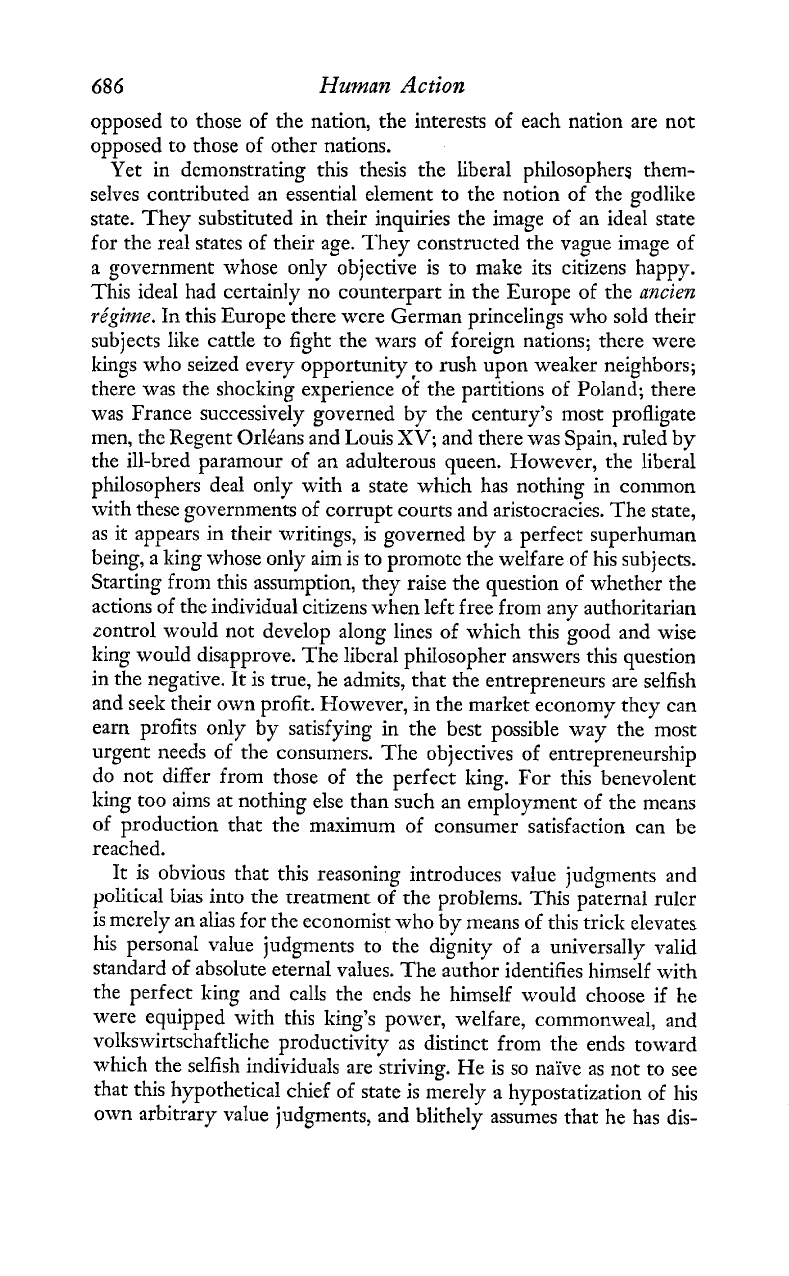
686
Human
Action
opposed to those of the nation, the interests of each nation are not
opposed to those of other nations.
Yet in demonstrating this thesis the liberal philosophers them-
selves contributed an essential element to the notion of the godlike
state. They substituted in their inquiries the image of an ideal state
for the real states of their age. They constructed the vague image of
a
government whose only objective is to make its citizens happy.
This ideal had certainly no counterpart in the Europe of the
ancien
rkgime.
In this Europe there were German princelings who sold their
subjects like cattle to fight the wars of foreign nations; thcre were
kings who seized every opportunity ,to rush upon weaker neighbors;
there was the shocking experience of the partitions of Poland; there
was France successively governed by the century's most profligate
men, the Regent OrlCans and Louis
XV;
and there was Spain, ruled by
the ill-bred paramour of an adulterous queen. However, the liberal
philosophers deal only with a state which has nothing in common
with these governments of corrupt courts and aristocracies. The state,
as it appears in their writings, is governed by
a
perfect superhuman
being, a king whose only aim is to promote the welfare of his subjects.
Starting from this assumption, they raise the question of whether the
actions of the individual citizens when left free from any authoritarian
~ontrol would not develop along lines of which this good and wise
king would disapprove. The liberal philosopher answers this question
in the negative. It is true, he admits, that the entrepreneurs are selfish
and seek their own profit. However, in the market economy they can
earn profits only by satisfying in the best possible way the most
urgent needs of the consumers. The objectives of entrepreneurship
do not differ from those of the perfect king. For this benevolent
king too aims at nothing else than such an employment of the means
of production that the maximum of consumer satisfaction can be
reached.
It is obvious that this reasoning introduces value judgments and
political bias into rhe rrearment of the probiems. This paternai ruicr
is merely an alias for the economist who by means of this trick elevates
his persona1 value judgments to the dignity of a universally valid
standard of absolute eternal values. The author identifies himself with
the perfect king and calls the ends he himself would choose if he
were equipped with this king's power, welfare, commonweal, and
volkswirtschaftliche productivity as distinct from the ends toward
which the selfish individuals are striving. He is so nai've as not to see
that this hypothetical chief of state is merely a hypostatization of his
own arbitrary vaIue judgments, and blithely assumes that he has dis-
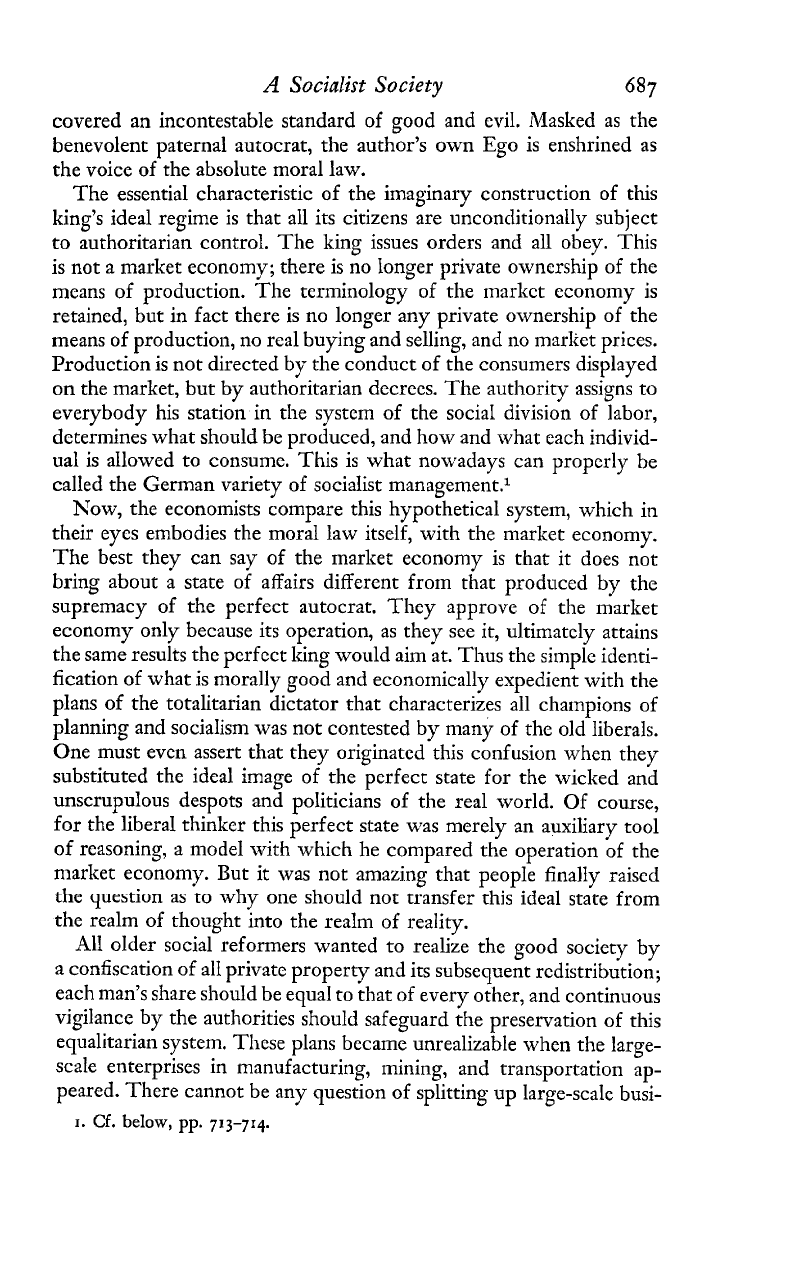
A
Socialist Society
687
covered an incontestable standard of good and evil. Masked as the
benevolent paternal autocrat, the author's own Ego is enshrined as
the voice of the absolute moral law.
The essential characteristic of the imaginary construction of this
king's ideal regime is that all its citizens are unconditionally subject
to authoritarian control. The king issues orders and all obey. This
is not a market economy; there is no longer private ownership of the
mcans of production. The terminology of the ~narkct economy is
retained, but in fact there is no longer any private ownership of the
means of production, no real buying and selling, and no market prices.
Production is not directed by the conduct of the consumers displayed
on the market, but by authoritarian decrees. The authority assigns to
everybody his station in the system of the social division of labor,
determines what should be produced, and how and what each individ-
ual
is
aIlowed to consume. This is what nowadays can properly
be
called the German variety of socialist management.l
Now, the economists compare this hypothetical system, which in
their eyes embodies the moral law itself, with the market economy.
The best they can say of the market economy is that it does not
bring about a state of affairs differcnt from that prodnced by the
supremacy of the perfect autocrat. They approve of the market
economy only because its operation, as they see it, ultimately attains
the same results the pcrfcct king would aim at. Thus the simplc identi-
fication of what is morally good and econo~nically expedient with the
plans of the totalitarian dictator that characterizes all champions of
planning and socialism was not contested by many of the old liberals.
One must even assert that they originated this confusion when they
substituted the ideal image of the perfect state for the wicked and
unscrupulous despots and politicians of the real world.
Of
course,
for the liberal thinker this perfect state was merely an auxiliary tool
of reasoning, a model with which he compared the operation of the
market economy. But it was not ama~ing that people finally raised
the
question
as
TO
why one shouid nor: transfer this ideai state from
the realm of thought into the realm of reality.
All older social reformers wanted to realize the good society by
a confiscation of a11 private property and its subsequent redistribution;
each man's share should be equal to that of every other, and continuous
vigilance by the authorities should safeguard the preservation of this
equalitarian system. These plans became unrealizable when the large-
scale enterprises in manufacturing, mining, and transportation ap-
peared. There cannot be any question of splitting up large-scale busi-
I.
Cf.
below,
pp.
713-714.
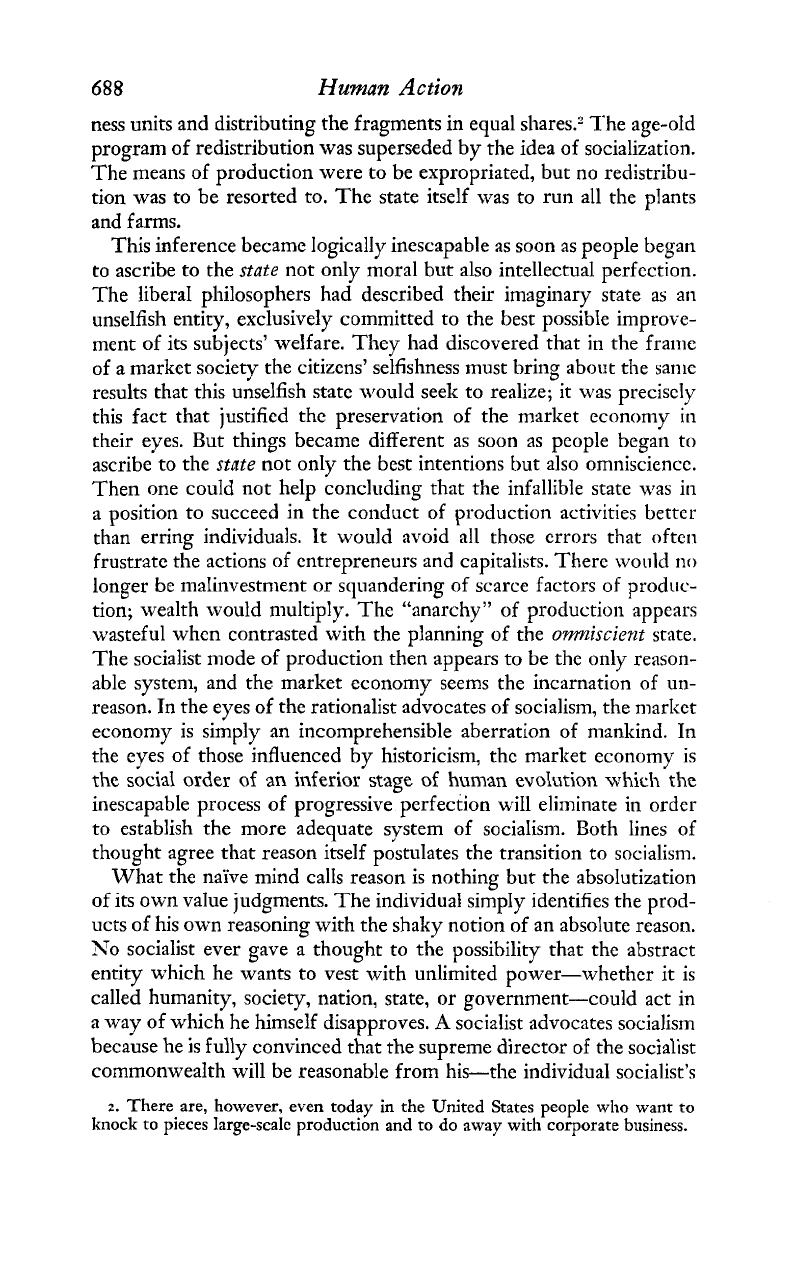
688
Human
Action
ness units and distributing the fragments in equal shares.? The age-old
program of redistribution was superseded by the idea of socialization.
The means of production were to be expropriated, but no redistribu-
tion was to be resorted to. The state itself was to run all the plants
and farms.
This inference became logically inescapable as soon as people began
to ascribe to the
state
not only moral but also intellectual perfection.
The liberal philosophers had described their imaginary state as an
unselfish entity, exclusively committed to the best possible improve-
ment of its subjects' welfare. They had discovered that in the frame
of a market society the citizens' selfishness must bring about the sanic
results that this unselfish state would seek to realize; it was precisely
this fact that justified the preservation of the market economy in
their eyes. But things became different as soon as people began to
ascribe to the
state
not only the best intentions but also omniscience.
Then one could not help concluding that the infallible state
as
in
a position to succeed in the conduct of production activities better
than erring individuals. It would avoid all those errors that often
frustrate the actions of entrepreneurs and capitalists. There
woiild
no
longer be maIinvestnient or squandering of scarce factors of produc-
tion; wealth would multiply. The "anarchy" of production appears
wasteful when contrasted with the planning of the
omniscient
state.
The socialist mode of production then appears to be the only reason-
able system, and the market economy seems the incarnation of un-
reason. In the eyes of the rationalist advocates of socialism, the marltct
economy is simply an incomprehensible aberration of mankind. In
the eyes of those influenced by historicism, the market economy is
the social order of
an
inferior stage of
human
evolution
which
the
inescapable process of progressive perfection wiIl eliminate in order
to establish the more adequate system of socialism. Both lines of
thought agree that reason itself postulates the transition to socialism.
What the na'ive mind calls reason is nothing but the absolutization
of its own value judgments. The individual simpIy identifies the prod-
ucts of his own reasoning with the shaky notion of an absolute reason.
So socialist ever gave a thought to the possibility that the abstract
entity which he wants to vest with unlimited power-whether it is
called humanity, society, nation, state, or government-could act in
a
way of which he himself disapproves.
A
socialist advocates socialism
because he is fully convinced that the supreme director of the socialist
commonwealth will be reasonable from his-the individual socialist's
2.
There are, however, even today
in
the United States people who want to
knock to pieces large-scale production and to do away with corporate business.
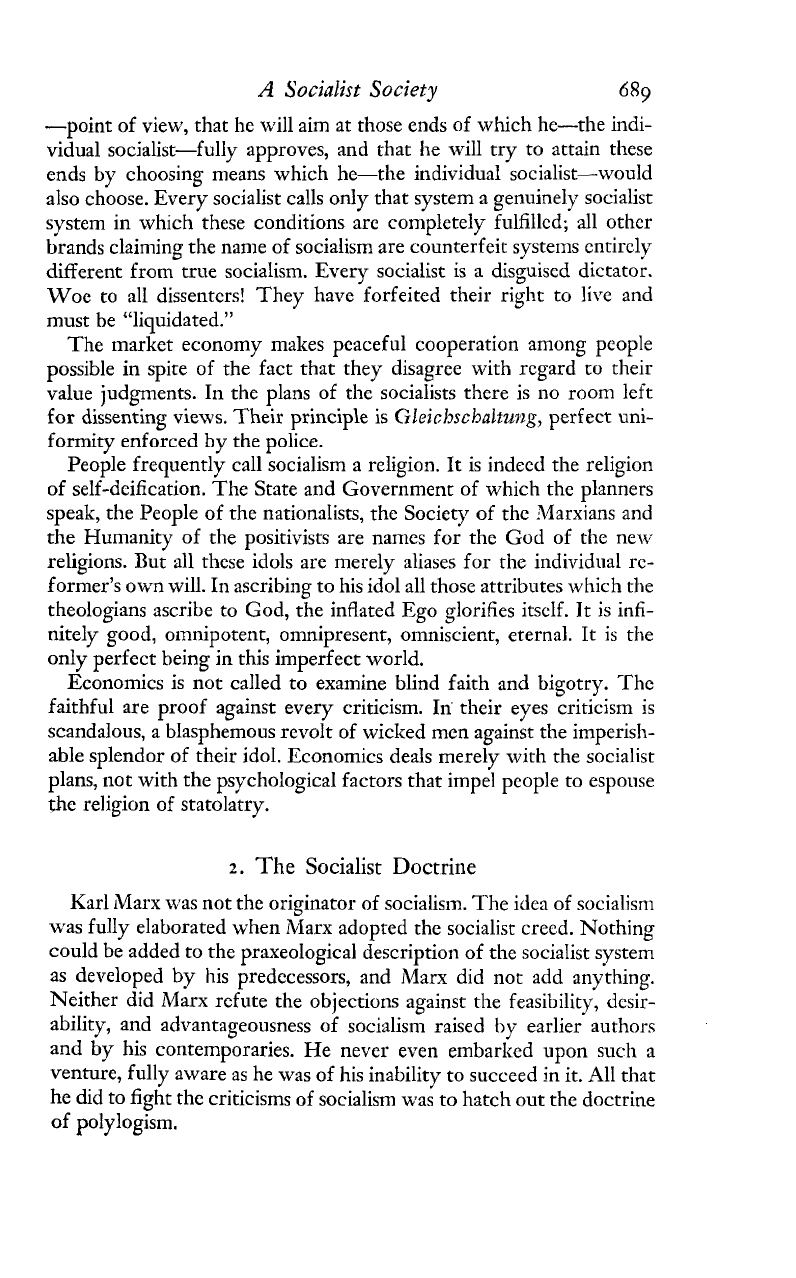
A
Socialist
Society
689
-point of view, that he will aim at those ends of which he-the indi-
vidual socialist-fully approves, and that he will try to attain these
ends by choosing means which he-the individual socialist-would
also choose. Every socialist calls only that system a genuinely socialist
system in which these conditions are completely
fulfilled;
all other
brands claiming the name of socialism are counterfeit systems cntirely
different from true socialism. Every socialist is a disguised dictator.
Woe to all dissentcrs! They have forfeited their right to live and
must be "liquidated."
The market economy makes peaceful cooperation among people
possible in spite of the fact that they disagree with regard to their
value judgments. In the plans of the socialists there is no room left
for
dissenting views. Their principle is
Gleichschaltu7tg,
perfect uni-
formity enforced by the police.
People frequently call socialism a religion. It is indccd the religion
of self-deification. The State and Government of which the planners
speak, the People of the nationalists, the Society of the Marxians and
the Humanity of the positivists are names for the God of the new
religions. But all these idols are merely aliases for the individual rc-
former's own will. In ascribing to his idol all those attributes which the
theologians ascribe to God, the inflated Ego glorifies itsclf. It is infi-
nitely good, omnipotent, on~nipresent, omniscient, eternal. It is the
only perfect being in this imperfect world.
Economics is not called to examine blind faith and bigotry. The
faithful are proof against every criticism. In their eyes criticism is
scandalous, a blasphemous revolt of wicked men against the imperish-
able splendor of their jdoI. Economics deals merely with the socialist
plans, not with the psychological factors that impel people to espouse
the religion of statolatry.
2.
The
Socialist Doctrine
Karl Marx was not the originator of socialism. The idca of socialism
was fully elaborated when Marx adopted the socialist creed. Nothing
could be added to the praxeological description of the sociaIist system
as developed by his predecessors, and Marx did not add anything.
Neither did Marx refute the objections against the feasibility, dcsir-
ability, and advantageousness of socialisn~ raised by earlier authors
and by his contemporaries. He never even embarked upon such a
venture, fully aware as he was of his inability to succeed
:
in it. All that
he did to fight the criticisms of socialism was to hatch out the doctrine
of
polylogism.
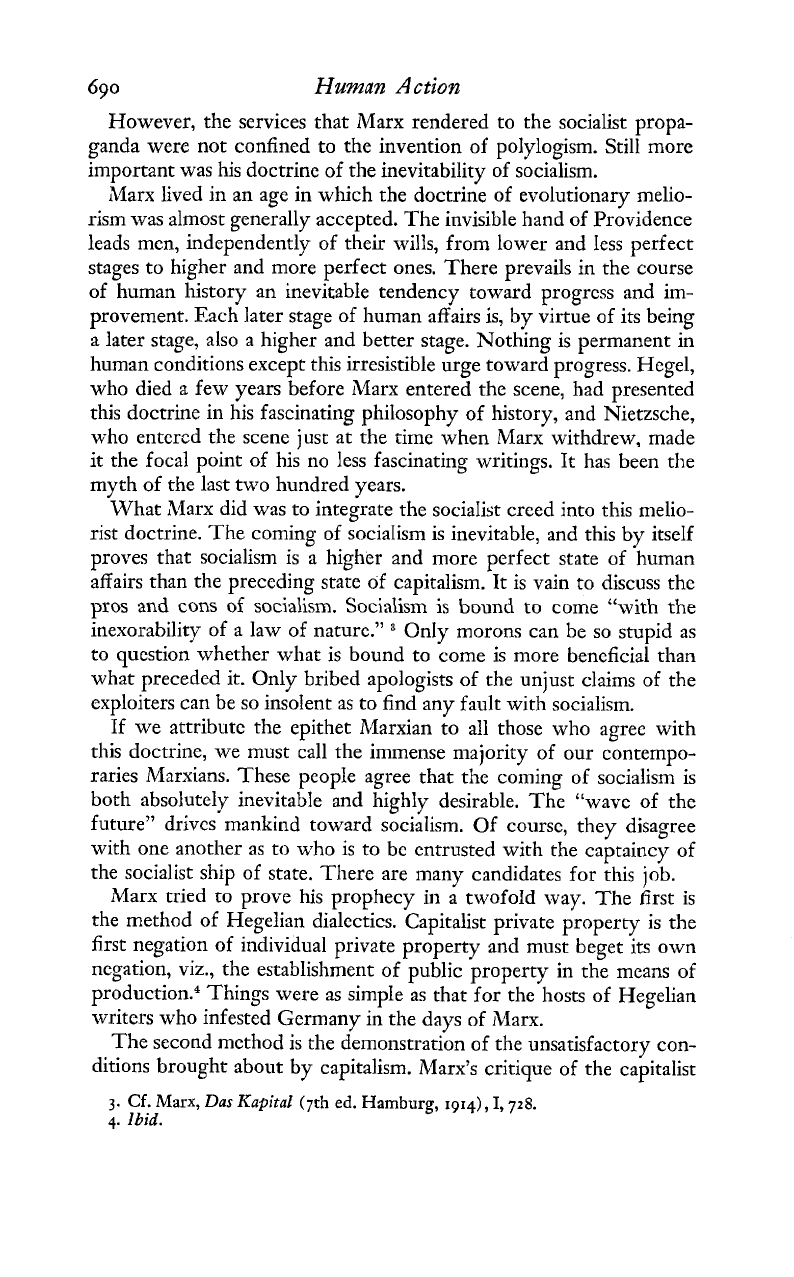
690
Human
Action
However, the services that Marx rendered to the socialist propa-
ganda were not confincd to the invention of polylogism. Still more
important was his doctrine of the inevitability of socialism.
Marx lived in an age in which the doctrine of evolutionary melio-
rism was almost generally accepted. The invisible hand of Providence
leads men, independently of their wills, from lower and Iess perfect
stages to higher and more perfect ones. There prevails in the course
of human history an inevitable tendency toward progress and im-
provement. Each later stage of human affairs is, by virtue of its being
a later stage, also a higher and better stage. Nothing is permanent in
human conditions except this irresistible urge toward progress. Hegel,
who died
a
few years before Marx entered the scene, had presented
this doctrine in his fascinating philosophy of history, and Nietzsche,
who entered the scene just at the time when Marx withdrew, made
it the focal point of his no less fascinating writings. It has been the
myth of the last two hundred years.
What Marx did was to integrate the socialist creed into this melio-
rist doctrine. The coming of sociaIism is inevitable, and this by itself
proves that socialism is a higher and more perfect state of human
affairs than the preceding state of capitalism. It is vain to discuss the
pros and cons of socialism. Socialism
is
bound to come
"with
the
inexorability of a law of nature." Only morons can be so stupid as
to question whether what is bound to come is more beneficial than
what preceded it. Only bribed apologists of the unjust claims of the
exploiters can be so insolent as to find any fault with socialism.
If we attribute the epithet Marxian to all those who agree with
this doctrine, we must call the immense majority of our contempo-
raries Marxians. These peopIe agree that the coming of socialism is
both absolutely inevitable and highly desirable. The "wave of the
future" drives mankind toward socialism. Of course, they disagree
with one another as to who is to bc entrusted with the captaincy of
the socialist ship of state. There are many candidates for this job.
Marx tried to prove his prophecy in a twofold way. The first is
the method of Hegelian dialectics. Capitalist private property is the
first negation of individual private property and must beget its own
negation, viz., the establishment of public property in the means of
production.* Things were as simple as that for the hosts of Hegelian
writers who infested Germany in the days of Marx.
The second method is the demonstration of the unsatisfactory con-
ditions brought about by capitalism. Marx's critique of the capitalist
3.
Cf.
Marx,
Das
Kapital
(7th
ed.
Hamburg,
1914),
I,
728.
4.
lbid.
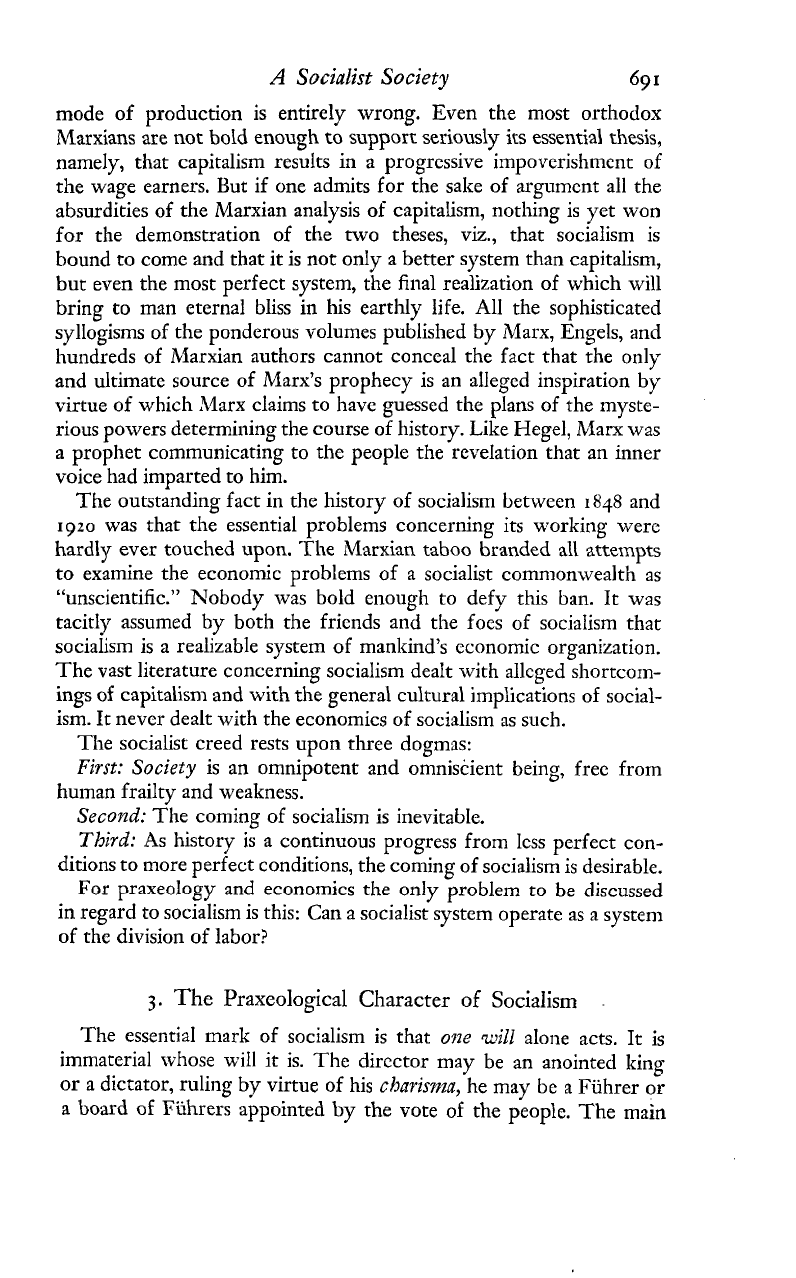
A
Socialist Society
691
mode of production is entirely wrong. Even the most orthodox
Marxians are not bold enough to support seriously its essential thesis,
namely, that capitalism results in a progressive impoverishment of
the wage earners. But if one admits for the sake of argument all the
absurdities of the Marxian analysis of capitalism, nothing is yet won
for the demonstration of the two theses, viz., that socialism is
bound to come and that it is not only a better system than capitalism,
but even the most perfect system, the final realization of which will
bring to man eternal bliss in his earthly life. All the sophisticated
syllogisms of the ponderous volumes published by Marx, Engels, and
hundreds of Marxian authors cannot conceal the fact that the only
and ultimate source of Marx7s prophecy is an alleged inspiration by
virtue of which Marx claims to have guessed the plans of the myste-
rious powers determining the course of history. Like Hegel, Marx was
a prophet communicating to the people the revelation that an inner
voice had imparted to him.
The outstanding fact in the history of socialism between
1848
and
1920
was that the essential problems concerning its working were
hardly ever touched upon. The Marxian taboo branded
all
attempts
to examine the economic problems of a socialist commonwealth as
"unscientific." Nobody was bold enough to defy this ban. It was
tacitly assumed by both the friends and the foes of sociaIism that
socialism is a realizable system of mankind's cconornic organization.
The vast literature concerning socialism dealt with alleged shortcom-
ings of capitalism and with the general cultural implications of social-
ism. It never dealt with the economics of socialism as such.
The socialist creed rests upon thee dogmas:
First:
Society
is an omnipotent and omniscient being, free from
human frailty and weakness.
Second:
The coming of socialism is inevitable.
Third:
As history is a continuous progress from less perfect con-
ditions to more perfect conditions, the coming of socialism is desirable.
For praxeology and economics the only problem to be discussed
in regard to socialism is this: Can a socialist system operate as a system
of the division of labor?
3.
The Praxeological Character
of
Socialism
The essential mark of socialism is that
one
will
alone acts. It is
immaterial whose wiIl it is. The director may be an anointed king
or a dictator, ruling by virtue of his
chnrisvza,
he may be a Fiihrer or
a
board of Fiihrers appointed
by
the vote of the people. The main
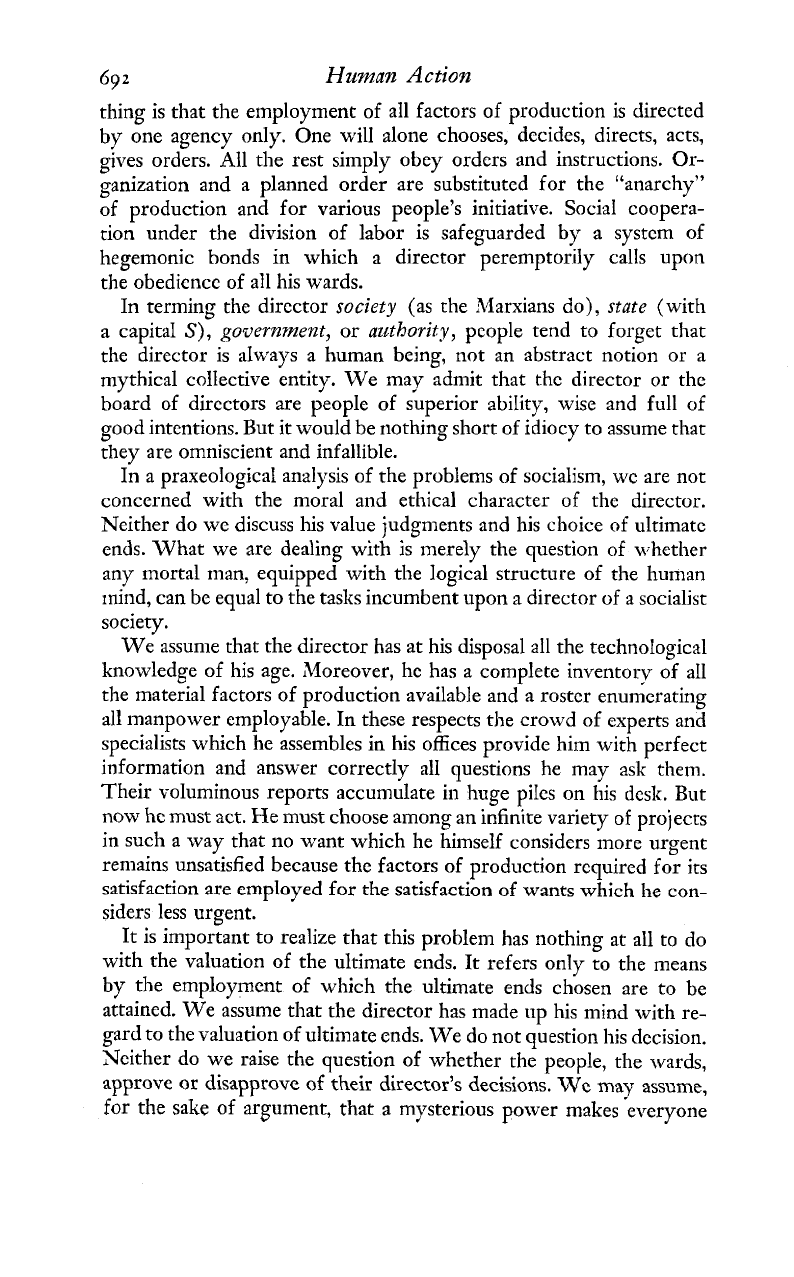
692
Human
Action
thing is that the employment of all factors of production is directed
by one agency only. One will alone chooses, decides, directs, acts,
gives orders. All the rest simply obey orders and instructions. Or-
ganization and a planned order are substituted for the "anarchy"
of production and for various people's initiative. Social coopera-
tion under the division of labor is safeguarded by a system of
hegemonic bonds in which a director peremptorily calls upon
the obedience of all his wards.
In
terming the director
society
(as the Marxians do),
state
(with
a capital
S),
government,
or
authority,
pcople tend to forget that
the director is always
a
human being, not an abstract notion or
a
mythical collective entity. We may admit that the director or the
board of directors are people of superior ability, wise and full of
good intentions. But it would be nothing short of idiocy to assume that
they are omniscient and infallible.
In a praxeological analysis of the problems of socialism, we are not
concerned with the moral and ethical character of the director.
Neither do we discuss his value judgments and his choice of ultimate
ends. What we are dealing with is merely the question of whether
any mortal man, equipped with the logical structure of the human
mind, can be equal to the tasks incumbent upon a director of a socialist
society.
We assume that the director has at his disposal all the technological
knowledge of his age. Moreover, hc has a complete inventorv of a11
the material factors of production available and a roster enu&erating
all manpower employable. In these respects the crowd of experts and
specialists which he assembles in his offices provide him with perfect
information and answer correctly all questions he may ask them.
Their voluminous reports accumulate
in
huge piles on his desk. But
now he must act. He must choose among an infinite variety of projects
in such a way that no want which he hiinself considers more urgent
remains unsatisfied because the factors of production required for its
satisfaction are employed for the satisfaction of wants which he con-
siders less urgent.
It is important to realize that this problem has nothing at all to do
with the valuation of the ultimate ends. It refers only to the means
by
the employlnent of which the ultimate ends chosen are to be
attained. We assume that the director has made up his mind with re-
gard to the valuation of ultimate ends. We do not question his decision.
Neither do we raise the question of whether the people, the wards,
approve or disapprove of
their
director's decisions.
Wc
may assume,
for the sake of argument, that a mysterious power makes kveryone
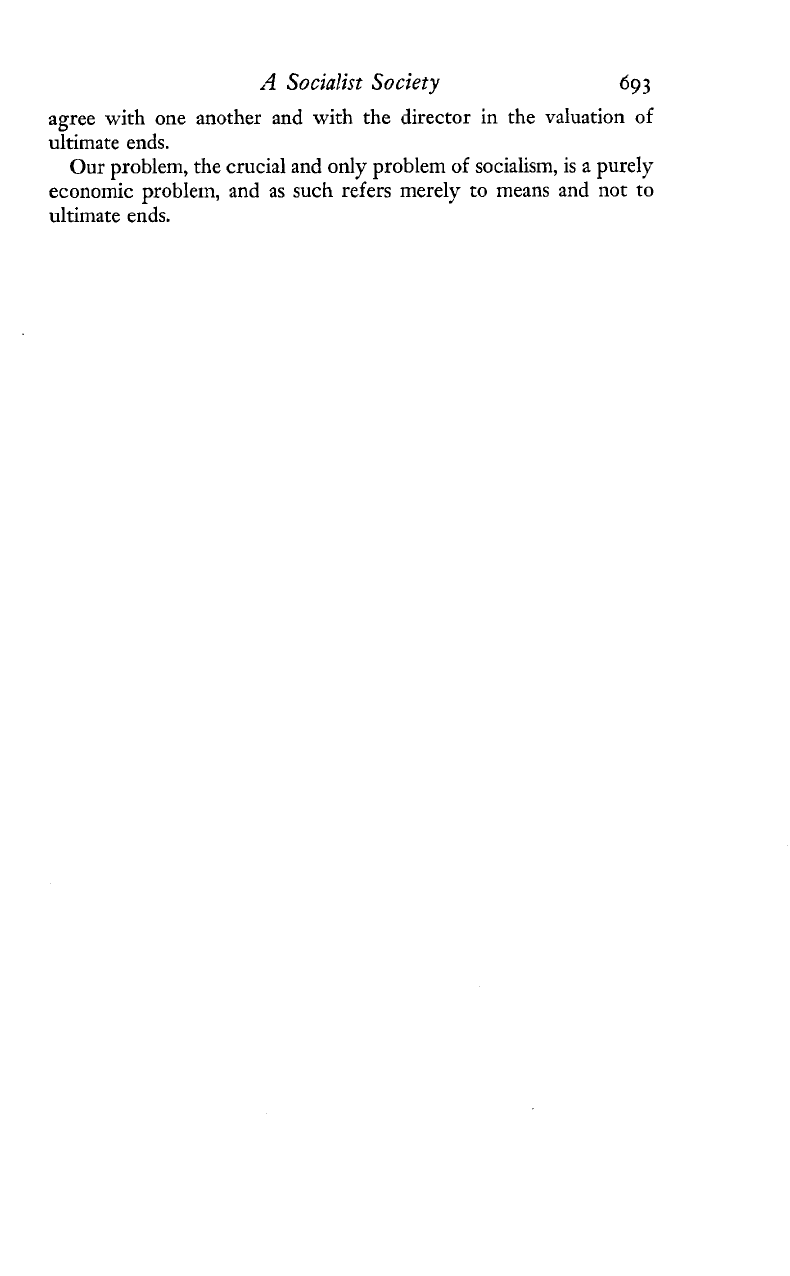
'4
Socialist
Society
69
3
agree with one another and with the director in the valuation of
ultimate ends.
Our
problem, the crucial and only problem of socialism, is a purely
economic problem, and as such refers merely to means and not to
ultimate ends.
